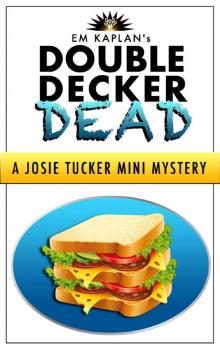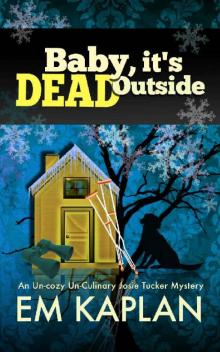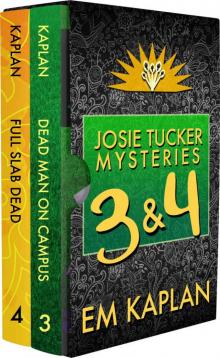- Home
- E M Kaplan
Unbroken Page 2
Unbroken Read online
Page 2
Charl sat with one thick arm resting on the table, twisting the solid green agamite ring on his finger. One side of it bore a circular sigil. She saw it flash before he turned it inward again—a nervous habit. A gift from his father, perhaps? Mel didn’t know. Pushing her cup aside, she placed her palm on the table surface. She stroked the grain with her fingertips. In her mind, she reached outward and traced the wood, feeling the ridges of it through her senses. The wood had been harvested from a tree north of Navio. Chopped by the axe of a tradesman. Just a trace of agamite in the compacted fibers of its center. She reached from the wood into Charl’s body and slipped under his skin. And was stopped short by an invisible barrier, something inside him blocking her examination.
She frowned at him, not bothering to disguise her confusion—he didn’t notice her expression as he picked at his fingernails with an aggression more suited to arguing than remaining silent. Trying again, this time with more force, she pushed into him. Now he flinched and lifted his arm from the table, rubbing his skin. He sat back in his chair, leaving her to wonder why she had been unable to sense anything about him—not even the trace of agamite that would be be in his blood. He was a northerner after all, and they were more saturated with the mineral. But no, the only agamite on Charl was the ring on his finger, from which she learned nothing.
She might have asked Ott about the young man. Although Ott was of an age to be a mentor to Charl, they kept their distance from each other, a tense barrier between them. She’d never noticed the strain before now. Smoothing her face, she glanced at Ott, wondering about the cause of it.
“It’ll take at least three weeks for us to reach Port Navio,” he said between bites of the bread his sister had sent with them. Nothing beat Jenny’s bread. Mel’s face fell at the thought of leaving her friend behind. Ott noticed and lifted an eyebrow. Shaking her head, Mel dismissed her sadness with a small smile. She’d almost gotten used to letting her expressions play across her face instead of hiding everything inside as she’d been raised and trained to do. Living an emotional, messy life was new for her, though she loved its noisy imperfection.
However, noisy was a relative term. Though the dining room had fallen silent for a moment, Mel could hear the creak of the wooden ship’s boards, the groan of Ott’s chair as he shifted his weight. The crunch of the crusty bread between his molars. Even the occasional pop of his joints when he stretched his jaw too much. She frowned—he’d been having bad dreams again, grinding his teeth in his sleep.
“Three weeks to get to Navio? That long?” the housemaid, Marget, asked, her strong fingers knitted together. She separated them long enough to push the flickering lantern away from where it perched too close to the table’s edge. Mel thought maybe the girl had never been away from home, never mind on a boat. So accustomed to seeing Marget with her brown curls tucked under a knit white cap that identified her station as a house maid, Mel was surprised to find the young woman had auburn-streaked hair, now braided and free from the confinement of her usual uniform. Other than the occasional annoying, longing glance the girl had snuck at Ott in the past, Mel found her to be a sweet girl. Now that she cast that familiar admiring glance at Charl, Mel found herself even more at peace in her presence.
“It took two weeks to travel north on the river from Navio to the northern port,” Mel said with a question in her voice. Every other tributary river she knew of flowed south and emptied into the gaping maw of the Great Sea. Each river mixed its waters with the ocean. The Uptdon’s waters, however, took an obstinate path northward, where they froze in the harsh, frigid mountains, and where, if legend were true, a great white beast sat at the top of the river chewing chunks of frozen water with enormous glass teeth.
“We’re going south against the current,” Ott explained after swallowing. Her eyes tracked the movement of his throat within his broad neck. Earlier that morning, she’d had her nose pressed against his skin, between where his neck met his shoulder. She could still smell his savory, spicy aroma to which she’d become more or less addicted. “It’s a slow process. The boat’s using agamite steam to help, but it’s still much slower than going north.” In fact, Mel could hear the incessant clanging, the pistons and engine churning with steam pressure from the stokehold. Under pressure, agamite could be used as fuel. A journey by river boat such as this would have taken three times as long just a decade ago. Though, it would not have been as noisy. If she didn’t work hard to shut the noise out, she’d have a headache the entire journey. Thanks to her training, she could partition off that part of her mind.
Mel didn’t know what lay in wait for them in the south. Navio—meaning the birthplace of trade—was the bustling center of commerce that joined both northern and southern lands, as well as east and west, right at the river. She was aware of the red desert and the Great Sea from what she’d studied, what she’d read in books. Her upbringing in the studious atmosphere of the Mask colony meant that research came as a second nature to her—it was instinctive, almost, for her to reach for a book when she wanted to know something. In reality, she’d never traveled farther south than Port Navio and her anticipation grew. She’d already exchanged her heavy northern boots for lighter sandals. Flexing her toes now, she imagined them sinking into the red sand of the southern desert. What stories would it tell her?
“At Navio, we’ll disembark and travel by wagon for several days east to Tooran for supplies,” Ott said. He glanced at the young man, Charl, giving him a stern, at least for Ott, once-over before assuring him, “There, we can go our separate ways if that’s what you want.”
The boat’s crew had relayed to them reports of trog attacks farther south of Navio. They planned to deposit Marget into the capable hands of friends—friends of Masks—whom Mel knew. She would not take the girl with them into potential danger—nor Charl either. Tooran city, far east of the river, had seen no signs of trouble with the trogs so far. Marget had talked about settling there some day, and Mel thought the girl might like the busy city life. Cobblestone paved streets, agamite powered lamps that lit the way at night with their faint green glow, and buildings with multiple floors and crank-powered lifts to raise people up in them. Mel shook her head. Were the denizens of Tooran even aware of the high cost, both in money and lives, that powered their agamite-rich lives? She doubted it.
Charl gave a curt, serious nod that belied his young age, his longish hair looking more brown than blond in the weak light of the room. Mel pitied him for a moment, hoping he had the strength of character to recover from the death of his father. At times, she wasn’t sure how she herself was faring. The ache of her loss was still fresh.
Chapter 3
“Have you wept for your parents—for your mother in particular?” Rav asked her.
Just the two of them remained at the wooden mess table. Shifting on her bench, Mel’s friend adjusted the cloth sling that held her baby girl, Salva, close to her chest. An occasional infant’s mewl came from the folds of the woven cloth. With smooth brown fingers, Rav patted the baby’s back. Rav’s rate of breathing was even and calm, at which Mel marveled. Every new circumstance her friend faced, she met with steadfast resolution, without fail. Abducted by monsters, imprisoned, and then pregnant in a strange, frozen land far away from her family, still she remained stalwart. Unchanged, remarkable, and worthy of emulation. If Mel had her way, Rav would never have to suffer again. And making sure her friend made it home would mean an end to upheaval and uncertainty. Gripping the edge of the table, in the flickering light, Mel vowed it would be so. As one who had no sisters, to one who felt like a sister.
Had Mel mourned for her parents? No, not in a meaningful manner. Leave it to Rav to cut to the heart of the matter. After Mel had settled into Ott’s small house up north, away from the big house, she’d…shut away the grief. There’d been no bodies. Jenks had seen to that with his makeshift bier. He’d sent their ashes high into the night sky, he’d told her later when she’d asked. But at least she’d had him for a time. He�
��d visited her once or twice at the big house, even though he’d been disguised as a trog, snuffling and chuffing, his trog scent not as strong as a true trog’s.
Being a shifter was a rare and not-always-welcome oddity in the Mask community. She gave a half-smile, remembering the story of his first shift—as a toddling babe, into the form of the household cat—and how, when he shifted, he’d often assume the behaviors and mannerisms of the creature or person he’d become. He told her he tended to lick the palms of his hands a good, long time after he’d switched back to being a human baby, much to his caretaker’s alarm.
Or when he’d become stern, heavy-browed Guyse, her parents’ escort into the northern region. Nothing about Guyse resembled the blue-eyed Jenks she’d known through childhood. Guyse had tried to protect them all…and failed. Now he was an exiled criminal, presumed dead. Though he wasn’t. Mel just didn’t know when she’d ever see him again—and he was the last of her blood kin. Glancing at Rav, cradling her baby, she felt the pang of loss she’d been suppressing for almost a year.
“You are going home,” she told Rav out loud, meeting her friend’s pitch black, shiny eyes. When Rav didn’t react, except to shift her baby from one side to the other, Mel said it again, “We’re taking you home.”
Rav’s oath to return to her sister had become Mel’s driving force. Her purpose. As if Rav were Mel’s sister—and in turn, Rav’s oath was Mel’s also.
“And I thank you for it,” Rav replied, though her voice was calm and even—and it sounded as if she didn’t believe Mel’s oath. Or rather, because of all the upheaval and traumatic events in their recent history, Rav had decided to believe in Mel if and when the reunion occurred. Mel had thought that people of the north were known for their stoicism and stalwart nature, but Rav had them beat in many ways. What other person could accept her former jailer as a mate?
At that moment, Bookman re-entered the room and sat with them. Mel eyed him. His current human appearance, however, was a far cry from his former beast state. Pink, smooth skin that could be burned, scratched, or penetrated by a knife, he was a far cry from the beast he'd once been before Mel had flushed the agamite from his body. Except for his unnatural silence. In Mel’s experience, most normal people—those outside the Mask community—tended to be somewhat…chatty.
But Rav, her friend with the iron running down her spine in place of all those little bits of bone, who was now looking at her with an unwavering gaze…Rav had vowed to her younger sisters—to Zunee, in particular—that she would return to them, and by whatever gods or deities her friends prayed to, Mel intended to help Rav keep that promise. No more broken promises. That was Mel’s silent oath to her now.
In his raspy voice that reminded Mel he hadn’t always been human, Rav’s mate, Bookman, said, “You’re worried?” As he peered at Rav, Mel examined him, the smoothness of a face that had once been gray with skin thick as an animal’s hide. Now, his face was tinged with pink, and though he still had thick, coarse hair on his head and his eyes were a fathomless black with little else to them, neither whites nor reflective light, his face shined with intelligence and sensitivity. Even Mel, with her superhuman sensitivity would not have been able to tell that her friend was anxious…had she not already known it.
“My worries about myself are not important,” Rav said. But as she straightened her baby’s sling, Mel saw the tiniest flex of Rav’s fingers as they cradled the small head through the soft, woven cloth. Her friend’s fear would never be for herself as much as for her child. “I do wonder how my sisters are,” Rav said. “They may be lost without me.”
Chapter 4
Zunee and Deni ran as fast as they could to keep ahead of the sandstorm. Even this far away, the swirling spiral of reds and browns loomed above them, blocking out half the sky and land as well. Dun-colored tendrils snaked out from the layers of dust and dirt. And the sound…a shrieking, wailing mixture. Not unlike a woman or a desert fox facing certain slaughter. Roaring as well, as if the spiral of sand were composed of tormented souls. Each time she turned her head to look, the enormous maligna had narrowed the distance to them. So they stretched their legs, feet almost floating over the red soil as they fled. But in the end it was no use.
They had just made it to the line of dead trees, the black, contorted spikes stabbing out of the ground, when the gale force winds overtook them. Locking her arms around the smooth black bark of the closest tree, she crouched, covering her face and mouth with the fabric of her zari. Wind-whipped sand stung the skin on her back. She lost sight of Deni as the dust consumed them. Cowering, she tried to breathe, though the wind and sand stole her air. The scream of the storm pitched higher. Louder. Almost enough to drive her mad. She closed her eyes. Prayed to the Great Mother of her people. Hoped, and clung to the dead branch with all her strength.
The wind raged, filling her eyes and nose with sand. The red granules stung her body in every place exposed and all down her back, though that was clothed. A thousand pinpricks. A thousand wasp stings. Every grain struck her skin with the force of a stone, yet as small as a needle. The storm took her breath and flayed her alive. Panic pressed into the edges of her mind. No breath entering her body, she grew faint and feared that when she closed her eyes, her hands would let go of the tree. Then she would be swept out to the center of the desert. Buried beneath a dune. Or maybe blown far away, up into the sky.
She saw a clear horizon. The red sun over the red sand, blue sky above. Day turned to night. The thousands of pricks of light sparkling in the night sky like gems, stars making a blanket as the desert air turned cool. Night became day, and day dimmed to night. Over and over in her mind at a dizzying pace.
She raced across the red sand, her feet on the powdery surface. She had always loved the wind. Loved how it felt on her skin, on her back, buffeting her, making her feet fly swifter. She was as light as a leaf. Dry as dust itself. She ran. She flew.
She was there. She was not there.
Then it was over.
The wind dropped off as if it had changed its mind. She almost reached for it, as if a part of her were missing. But the sand cloud dissipated, some of the grains falling in a shower of red silt, soft as powder on her shoulders. The roar that had filled her ears and stifled all of her thoughts fell off, as if a blanket had been lifted. She coughed and gasped, fighting to make her lungs work as they used to. Opening her gritty eyes, Zunee searched for Deni. She turned in each direction, though she saw nothing but red. Including herself, her arms, her legs, her feet, the clotted eyelashes framing her vision.
Behind her came a sharp cry of frustration, a string of curses the likes of which she hadn’t heard since her father had died. Spinning, she scanned the area. When she saw movement in the sand, she ran toward Deni, grabbing his arm to pull him upright. He had landed on his back, arms sprawled apart, in the middle of…nothing. How had he not been carried away by the force of the winds?
He sat up, sand cascading from his chest and shoulders, leaving his skin painted red. He slammed his fist into the dirt, the curses continuing for some time. She began to lose patience for his dramatics.
Grimacing he admitted at last, “I lost the goat.”
She stood then, crossing her arms over her front. “We almost are killed, suffocated by a red devil, and you’re insulting the old gods about losing the goat?”
From his position, sitting on the ground, he looked up at her, “Doesn’t that make you angry, too?”
He knew her too well. Now that the immediate danger was over…yes, she was upset about losing their meal. Very angry. Not having died required them to continue their pathetic, doomed mission to find sustenance. A struggle of which she was growing weary. But he didn’t need to know how she felt—feelings were weak. Acknowledging them made her weak as well. She shrugged. “It’s too bad you weren’t strong enough to hold on to it.”
He flipped a handful of sand at her legs, but it didn’t matter—she was covered with it from head to toe anyway.
&n
bsp; “Next time, I will tie it to your stubborn shoulders,” he said, rising from the ground. He swatted the top layer of dust off himself and looked around, noting how far from the tree line he had been blown. She watched him calculate the distance, confusion wrinkling his smooth forehead. He look back and forth a couple of times, probably wondering as she was, how he had survived.
Poking his sandaled toe into the dirt, he unearthed something, a piece of the rope he’d used to truss the goat’s legs together before he’d looped it across his shoulders.
“What is it?” she asked, at the further confusion on his face. He held out the rope for her to examine. Instead of a raveled end, the woven strands of the coarse jute length were severed straight across, as if sliced by a knife. “Maybe it was cut on the edge of your spear,” she suggested, though that didn't seem possible. His spear was on the ground a few more paces away, off to the side. He’d been carrying it point downward, as they both did when they ran. He gathered up the rest of the length of the rope, no doubt planning to repair it later.
Both of them felt uneasy, though neither would acknowledge it out loud. The fibers looked as if they had been cut by a blade or by sharp teeth, as if the storm had stolen the meat from them and then run away. Pleased with its catch. Satisfied by its theft.

 Double Decker Dead
Double Decker Dead The Bride Wore Dead
The Bride Wore Dead Baby, It's Dead Outside
Baby, It's Dead Outside Josie Tucker Mysteries Box Set 2
Josie Tucker Mysteries Box Set 2 Unbroken
Unbroken